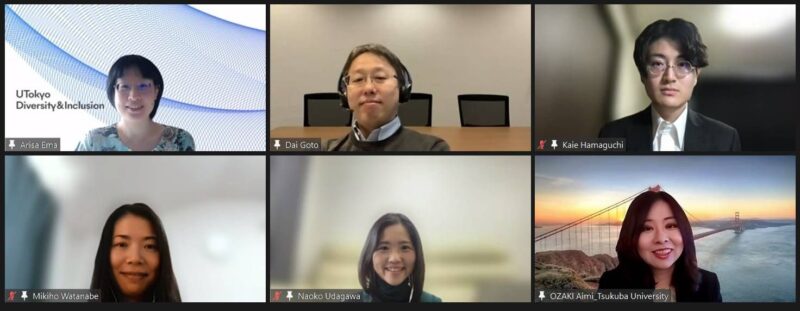AI Governance and Initiatives for Implementing AI Systems in Law Enforcement: Introduction of the Interpol/UNICRI Toolkit and its Implications for Japan

Event Report
AI Governance and Initiatives for Implementing AI Systems in Law Enforcement: Introduction of the Interpol/UNICRI Toolkit and its Implications for Japan
With the increasing adoption of artificial intelligence (AI) across various sectors, it has become crucial for law enforcement agencies, including the police, to evaluate the risks associated with AI systems. Striking a balance between the necessity of conducting investigations and safeguarding human rights in AI utilization is of paramount importance.
The Japanese police currently employ an AI system to analyze vast volumes of transaction data related to money laundering and determine the significance of this information. In the private sector, there is also the operation of AI systems equipped with behavior analysis and facial recognition technology in security cameras to detect suspicious individuals and objects.
To promote responsible AI implementation in law enforcement, the International Criminal Police Organization (INTERPOL) and the United Nations Interregional Crime and Justice Research Institute (UNICRI) have introduced a set of AI principles. They have developed a “Toolkit for Responsible AI Innovation in Law Enforcement,” which outlines these principles. While this toolkit is primarily designed for law enforcement agencies, it encompasses principles that can be applied to any organization utilizing AI. Thus, it proves valuable not only to law enforcement agencies but also to public institutions and businesses integrating AI into their operations.
In this webinar, we will introduce the toolkit and delve into critical topics confronting law enforcement agencies. These include ethical considerations, transparency, privacy protection, anti-bias measures, and security assessments related to the implementation of AI systems. Given the growing international interest in AI governance, we anticipate that the discussion will extend to Japanese law enforcement agencies. We aim to explore the future directions for AI utilization within Japanese law enforcement while raising awareness of these pivotal issues among various agencies, organizations, and businesses leveraging AI technology.

Top row, from the left; Ms. Ema, Mr. Goto, Mr. Hamaguchi. Bottom row, from the left; Ms. Watanabe, Ms. Udagawa, Ms. Ozaki
The event included an overview of the "Toolkit for Responsible AI Innovation in Law Enforcement" developed by INTERPOL and UNICRI, case studies and discussion points on the use of AI in law enforcement in Japan, and a panel discussion based on the above. The event was held in conjunction with a panel discussion based on the above. This event was held as a zoom webinar open to the public with pre-registration required, and was attended by approximately 50 participants from universities and companies in Japan.
First, Ms. Arisa Ema, Associate Professor at Tokyo College, The University of Tokyo, gave opening remarks and comments explaining the purpose of this event. The purpose of this event are to provide a brief introduction to the "Toolkit for Responsible AI Innovation in Law Enforcement," jointly developed by INTERPOL and UNICRI in June 2023, and to discuss, based on the Toolkits, several issues related to the use of AI in law enforcement agencies in Japan, such as the police.
Next, we moved to the overview section of the Toolkit. In this section, participants first watched a 20-minute video message prepared by INTERPOL and UNICRI. In the video message, those who were actually involved in the development of the Toolkit explained the purpose and contents of the "Toolkit for Responsible AI Innovation in Law Enforcement". Following the video, Ms. Ema commented on the background of the Toolkit's creation. She stated that this toolkit is one of the outcomes of ongoing activities by INTERPOL and UNICRI since 2019 on the use of AI in law enforcement, and that such discussions will continue. She also noted that Ms. Arisa Ema herself has directly participated in these discussions, which made it possible for the University of Tokyo to host this event. And then, Mr. Kaie Hamaguchi, Graduate School of Public Policy, The University of Tokyo, gave a brief explanation of the purpose, targets. and contents of the Toolkit. He stated that the Toolkit consists of seven major documents and can help law enforcement agencies which are considering implementing AI systems to understand responsible AI innovations and actually incorporate it into their operations.
After an overview of the "Toolkit for Responsible AI Innovation in Law Enforcement," jointly developed by INTERPOL and UNICRI, the event moved on to the topic section. In this section, Ms. Aimi Ozaki, Business Science, University of Tsukuba, and Ms. Naoko Udagawa, School of Public Policy, Tohoku University School of Law, provided topics and gave 15-minute presentations respectively.
First, Ms. Ozaki gave a presentation on " Introduction of case studies of AI use in police and law enforcement in Law Enforcement Agencies ". In Japan, for example, the Kyoto Prefectural Police introduced a predictive crime prevention system in October 2015, and in recent years, the Metropolitan Police Department and five prefectural police departments have been conducting SNS investigations using AI. In addition, there are AI examples of public-private partnerships, such as the emergency image transmission system between East Japan Railway Company and the police, which was introduced for the 2021 Tokyo Olympics. Ms. Ozaki concluded her presentation by pointing out that these cases are being discussed from the viewpoint of personal information protection, and that their introduction is expected to proceed in earnest in the future, and then ensuring credibility in AI law enforcement activities is an important first step.
Next, Ms. Udagawa made a presentation on " Discussion Points on AI Utilization in Law Enforcement Agencies”. In Japan, the use and introduction of AI in law enforcement is required to maintain manpower in public administration and to improve the efficiency of law enforcement activities, and is being considered as a government strategy. In this regard, there are three issues, scalability issues such as unconscious discrimination in data and algorithms, traceability issues such as clarification of the decision-making process and responsibility, and accessibility issues such as ensuring that no one is left out of the improved convenience of AI-based public services. After pointing out the existence of these issues, Ms. Udagawa said that the toolkit, as a reference material, may provide certain suggestions to Japanese law enforcement agencies considering the use of AI systems.
Following the presentations by Ms. Ozaki and Ms. Udagawa, a five-person panel discussion was held with Ms. Ema, Ms. Ozaki, and Ms. Udagawa, as well as Mr. Dai Goto, Attorney at Law, Harumi Partners and Ms. Mikiho Watanabe, Attorney at Law, Executive Director, AI and Law Society.
First, Ms. Watanabe provided the theme for the panel discussion and some comments on previous discussions. The first theme in the panel discussion was "how to implement the AI Toolkit in the actual field," and Ms. Watanabe stated that the discussion needed to start from two perspectives; what is the need for implementation and how to implement it. As for the necessity of AI governance, she said that businesses, developers, and users involved in AI systems must also be aware of those discussions because standardization and institutionalization of AI governance principles have been discussed globally in recent years, and in Japan, for example, the Ministry of Economy, Trade, and Industry is preparing guidelines for such discussions. She also stated that the Toolkit will serve as a tool to support police in their law enforcement activities based on existing national principles and standards in actual implementation, and that documents such as the Workbook of the Toolkit in particular could be used as a careful checklist for police and other law enforcement agencies in introducing and implementing AI systems.
Based on Ms. Watanabe's opinion, Ms. Ozaki commented on whether the Toolkit has reached a level where it can actually be used in the field. Ms. Ozaki pointed out that while the Toolkit is detailed and comprehensive, it needs to be organized and sequenced from a practical perspective in a way appropriate for each user in order to be used in practice. And Mr. Goto, pointing out that private vendors may develop AI systems and provide data for police use, also questioned whether the principles of AI governance as outlined in the Toolkit, such as accountability, are currently being shared by the private sector, and said that it is also important for the private sector to respond to these principles. And then, Ms. Udagawa, stating the importance of the private sector in planning and developing AI systems for the police, pointed out that the Toolkit is a very detailed and voluminous document and that it overlaps with the existing AI Governance Principles, which could be a burden for those actually using it in the field.
Next, Ms. Ema offered the theme, "who, when, and how to initiate AI governance in law enforcement activities". First, pointing out that currently, awareness of AI governance among companies making AI, especially those other than large companies, is low, Ms. Watanabe suggested that it may be necessary to provide incentives in the form of subsidies to companies that conduct AI governance. Ms. Ozaki stated that demonstrating AI governance, like the SDGs in Japan, could be an incentive for private companies, like the U.S., where governance of AI and other advanced science and technology is an important incentive for companies.
Related to the incentive to demonstrate human rights protection in corporations, Ms. Ema raised the question of what law enforcement agencies should place particular emphasis on in various governance guidelines, including AI Toolkits. In this regard, Ms. Udagawa stated that it would be particularly important to ensure the credibility of such AI law enforcement activities, given that Japan has a particularly high level of halation to law enforcement agencies when their activities using AI systems are ultimately illegal.
After the above discussion, the event turned to the second theme. First, Mr. Goto provided the theme and comments. The second theme was "Differences between the toolkit developed by INTERPOL and UNICRI and other AI governance guidelines," and Mr. Goto pointed out that the toolkit differs from other guidelines in that legality is first stated in the "Responsible AI Innovation Principles" of the toolkit and its contents are described in detail. In this regard, Ms. Watanabe and Ms. Ozaki stated that the toolkit is aimed at AI governance by law enforcement agencies, not private sector AI governance, and that legality in law enforcement activities is probably of particular importance since investigations and human rights violations are closely related. And then, Ms. Udagawa also stated that since the toolkit is intended for the entire world, it is likely to include detailed and comprehensive information on legality, etc., which is already taken for granted in Japan.
Based on these discussions, Ms. Ema asked the other panelists about the challenges of the Toolkit. First, Ms. Watanabe stated that it would be necessary to involve a wide range of stakeholders with varying degrees of knowledge, including not only law enforcement personnel, but also technology developers and private sector operators. Next, Mr. Goto stated that the challenge is whether or not the Toolkit can be integrated into the actual context and conditions of Japanese law enforcement agencies, and that it would be difficult to actually use the Toolkit in the field at the present time. Ms. Ozaki also pointed out that from the perspective of actual use in the field, it would be good to expand the description of the case method to include specific examples of law enforcement activities. Finally, Ms. Udagawa also stated that detailed descriptions based on specific cases are important, and that it would be necessary for actual organizations and groups to conduct trial and error in accordance with the actual conditions at their respective sites.
The panel discussion ended with the above, and Ms. Ema gave her closing comments as well as closing remarks. Ms. Ema concluded the event by stating that she would like to continue the study group together with the participants of this event, because, as often mentioned in the panel discussion, the viewpoints and test cases from the field are necessary for the Toolkit to be used in the actual field.
(Written by Kaie Hamaguchi, Graduate School of Public Policy, The University of Tokyo)
| Date(s) | Monday, 20 November 2023, 2:00-4:00pm |
|---|---|
| Venue |
Zoom Webinar (Register here) |
| Registration | Pre-registration required |
| Language | Japanese language only |
| Abstract |
Outline
With the increasing adoption of artificial intelligence (AI) across various sectors, it has become crucial for law enforcement agencies, including the police, to evaluate the risks associated with AI systems. Striking a balance between the necessity of conducting investigations and safeguarding human rights in AI utilization is of paramount importance.
The Japanese police currently employ an AI system to analyze vast volumes of transaction data related to money laundering and determine the significance of this information. In the private sector, there is also the operation of AI systems equipped with behavior analysis and facial recognition technology in security cameras to detect suspicious individuals and objects.
To promote responsible AI implementation in law enforcement, the International Criminal Police Organization (INTERPOL) and the United Nations Interregional Crime and Justice Research Institute (UNICRI) have introduced a set of AI principles. They have developed a “Toolkit for Responsible AI Innovation in Law Enforcement,” which outlines these principles. While this toolkit is primarily designed for law enforcement agencies, it encompasses principles that can be applied to any organization utilizing AI. Thus, it proves valuable not only to law enforcement agencies but also to public institutions and businesses integrating AI into their operations.
In this webinar, we will introduce the toolkit and delve into critical topics confronting law enforcement agencies. These include ethical considerations, transparency, privacy protection, anti-bias measures, and security assessments related to the implementation of AI systems. Given the growing international interest in AI governance, we anticipate that the discussion will extend to Japanese law enforcement agencies. We aim to explore the future directions for AI utilization within Japanese law enforcement while raising awareness of these pivotal issues among various agencies, organizations, and businesses leveraging AI technology.
References The “Toolkit for Responsible AI Innovation in Law Enforcement,” jointly developed by INTERPOL and UNICRI is available at the following link: INTERPOL: https://www.interpol.int/How-we-work/Innovation/Artificial-Intelligence-Toolkit UNICRI: https://unicri.it/topics/Toolkit-Responsible-AI-for-Law-Enforcement-INTERPOL-UNICRI
The event report of “Benefits and Risks of AI for Crime Prevention and Law Enforcement” (March, 2020), inviting Mr. Irakli Beridze, Head of the United Nations Interregional Crime and Justice Research Institute (UNICRI) is available at the following link: |
| Program |
Program 14:00-14:10 Introduction
14:10-14:30 Introduction of Toolkits from UNICRI/Interpol (video streaming with Japanese subtitles)
14:30-15:00 Introducing Toolkits contents
15:00-15:15 Introduction of case studies of AI use in police and law enforcement in Law Enforcement Agencies
15:15-15:30 Discussion Points on AI Utilization in Law Enforcement Agencies
15:30-15:55 Panel Discussion and Q&A
15:55–16:00 Closing remarks |
| Organized by | Tokyo College, The University of Tokyo |
| Contact | tg-event@tc.u-tokyo.ac.jp |















